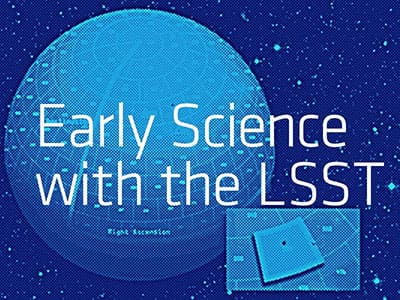The Division for Planetary Sciences of the American Astronomical Society has posthumously awarded Paul Feldman with the 2024 Kuiper prize for outstanding contributions to planetary science. The Division also awarded David Sing with the 2024 Alexander Prize for a mid-career scientist who has made outstanding contributions to our knowledge of planetary systems.
News & Announcements Archive

Kevin Schlaufman Receives National Science Foundation CAREER Award
Assistant Professor Kevin Schlaufman has received a National Science Foundation CAREER Award for his research focused on Population III stars titled “The Most Ancient Stars in the Milky Way.” The NSF CAREER Awards are given in support of junior faculty who exemplify the role of teacher-scholars through research and education, and the integration of these endeavors in the context of their organizations’ missions. The awards, presented once each year, include a federal grant for research and education activities for five consecutive years.

David Kaplan and Surjeet Rajendran Receive Frontiers of Science Award in Theoretical Physics
Professor David Kaplan and Associate Professor Surjeet Rajendran are recipients of the 2024 Frontiers of Science Award in Theoretical Physics awarded by the International Congress of Basic Science. The award recognizes a publication that they co-authored with Peter W. Graham titled “Cosmological Relaxation of the Electroweak Scale” as a breakthrough in its field of cosmological evolution.

Sam Grunblatt Leads Research of Exoplanet Able Retain Atmosphere in Close Proximity to a Red Giant
Assistant research scientist Sam Grunblatt has published new research in The Astronomical Journal on a rare exoplanet that should have been stripped down to bare rock by its nearby host star’s intense radiation, but somehow grew a puffy atmosphere instead.

Euclid Space Telescope Releases New Images and First Science Results
The European Space Agencey’s Euclid Space Telescope has unveiled its early release observations and the mission’s first scientific data. Bloomberg Distinguished Professor Chuck Bennett, Professor Brice Ménard, and Associate Research Scientist Graeme Addison are part of Euclid’s science team and have access to the telescope’s early results.

David Sing Leads JWST Research that Offers First Glimpse of an Exoplanet’s Interior
Bloomberg Distinguished Professor David Sing is the lead author of a publication in Nature this week that employs the James Webb Space Telescope to make the first measurements of an exoplanet’s core mass.

Alex Sushkov’s Magnetic Resonance Research Featured in Quanta Magazine
Alex Sushkov, who begins his appointment at JHU in 2025, is the focus of a new Quanta Magazine article titled “He Seeks Mystery Magnetic Fields With His Quantum Compass”

Louise Breuval Receives 2024 Research Fellowship in Space Science from European Space Agency
Postdoctoral Researcher Louise Breuval has been selected by the European Space Agency to become one of twelve 2024 Research Fellow in Space Science. Early career postdoctoral scientists are offered the unique opportunity to carry out advanced research related to the space science areas covered by ESA Science missions for a period of up to three years.

Floor Broekgaarden and Kevin Schlaufman Selected as Fellows to Realize the Full Potential of LSST
Assistant Research Professor Floor Broekgaarden and Assistant Professor Kevin Schlaufman been selected as two of the 50 Fellows for the first meeting of a Scialog initiative to advance the foundational science needed to realize the full potential of the Vera C. Rubin Observatory’s upcoming Legacy Survey of Space and Time (LSST).
Alexis Li Receives Provost’s Undergraduate Research Award
Physics major Alexis Li has received the Provost’s Undergraduate Research Award (PURA) from the Hopkins Office for Undergraduate Research in recognition of her outstanding undergraduate research titled “A JWST Mid-Infrared View on the Debris Disk around Eta Corvi: A New Insight on Time Variability.”
